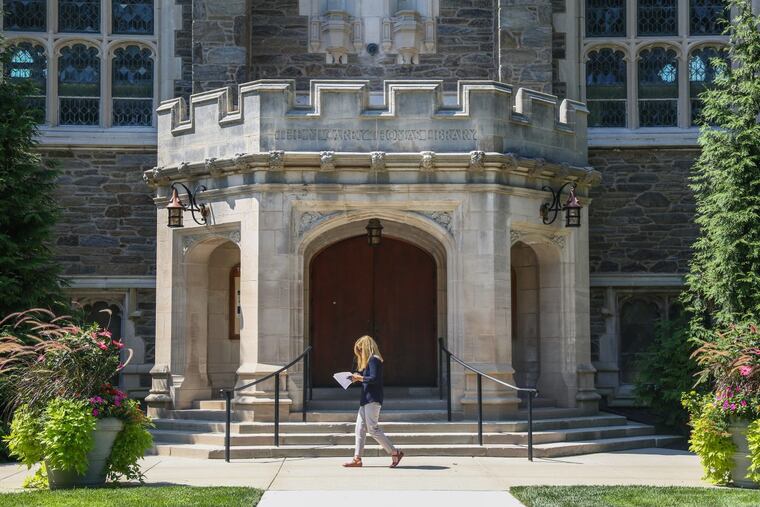At local colleges, criminal records still hold applicants back
Many local colleges require applicants to list even juvenile adjudications - and some explicitly reject students because of their records.

When you apply for a job in Philadelphia, employers can't ask about your criminal record on the application, or even during the interview. Under the city's "ban the box" law, they must wait until after they've made you a job offer.
For colleges, though, it's a different story.
In fact, many local colleges and universities require applicants to list even juvenile adjudications – and some explicitly reject students because of their records. Research has found such policies don't make campuses any safer. And according to a new report from Community Legal Services of Philadelphia, they disproportionately impact students of color and may even violate federal civil rights law.
"We've had many clients over the years who were either afraid of trying to pursue the path they wanted to, or were trying to get into school and were told, 'You can't, because of this record,' " said Jamie Gullen, a CLS lawyer.
One is Al Flowers, 64, of Mount Airy, who went back to school in his 50s after decades in prison. He excelled at Community College of Philadelphia, earning an associate's degree — but was rejected when he applied to Drexel University to complete his bachelor's.
"I was denied simply because of my background. It wasn't academics, because I was a Phi Theta Kappa honors student from Community College." He said an admissions officer told him as much.
"The way it is now, it's like you're never finished doing your time," he said. "You're denying people, and the people you're denying are basically people of color."
In Philadelphia, black youths are 3.64 times as likely as their white peers to face prosecution in juvenile court, according to a CLS analysis of court data.
Flowers is tenacious: He went on to complete his bachelor's at Philadelphia University, and is working on a master's degree at Drexel. But many others get discouraged. A study of complete and incomplete applications to the State University of New York system found that "each year 2,924 applicants to SUNY check the box disclosing a felony conviction. Of those, 1,828 do not complete the application."
Drexel, the University of Pennsylvania, Villanova University, Bryn Mawr College, and Haverford College all use the Common Application, which requires students to self-report if they were found guilty as juveniles or convicted of a misdemeanor or felony unless the record has been expunged. Since juvenile adjudications have a five-year waiting period for expungement in Pennsylvania, such a question could capture even minor childhood offenses. According to CLS, St. Joseph's University and Widener University ask for the same information.
St. Joseph's said in a statement that it undertakes a "holistic application review process" in order to create a "diverse and inclusive learning environment."
Haverford dean of admission and financial aid Jess Lord said in an email that it's "a matter of due diligence."
"In my view, more important than asking the question is what we do with the information," Lord said. "If a student were to answer yes to the question about criminal record, they would be prompted to provide an explanation. It is really the explanation we would be evaluating, rather than the simple yes or no question. We would be seeking to understand the situation, how the student dealt with it, and how they have learned and grown from it."
Other colleges don't ask for juvenile adjudications, but require applicants to list all convictions, even summary offenses like disorderly conduct. Temple University, Arcadia University, Philadelphia University, Lincoln University, Eastern University, and Chestnut Hill College are in that group. Penn State asks for all of that plus diversion programs, though those are specifically designed to help people avoid criminal convictions.
A Temple spokesman said that criminal history is just one factor considered, but added that it may be more relevant in certain disciplines related to professions, such as nursing or law, that require background clearances.
Even some victim advocates criticize such policies, pointing to studies that have shown they don't make campuses any safer.
"We see this policy as having a major impact on the ability of students of color to access education, because their communities tend to be over-policed," said Alyssa Peterson, who was a victim of on-campus sexual assault and now works with Know Your IX, an organization for survivors of sexual violence in schools.
"My perpetrator does not have a criminal record," she said. "A number of people who perpetrate sexual assault on campus do not have criminal records, so it's not a predictive policy."
Under Title VI of the Civil Rights Act, a school that receives federal funding may not implement a policy that disproportionately impacts a protected class, such as people of color, without a legitimate justification.
College administrators and state legislators are starting to take notice. Louisiana in June became the first state to bar public universities from asking about applicants' records, while SUNY announced it will remove criminal history questions from its applications starting next year.
But for schools that use the Common Application, it's not so simple. The Common Application considered removing the question earlier this year, but opted to modify it and provide more detail on how that information is used.
"The changes to the 2017-2018 Common Application followed careful consultation with our more than 750 member schools," Jenny Rickard, chief executive of the Common Application, said in a statement. "Our members have the option not to receive student responses to the criminal and disciplinary history questions. That said, a significant majority of member schools have indicated that the criminal history and school discipline questions should remain."
Gullen is hoping colleges will begin applying pressure for a broader change – and not only because of legal questions.
"We're asking schools to consider whether they're reducing the diversity and vitality of their campuses by creating this barrier," she said.